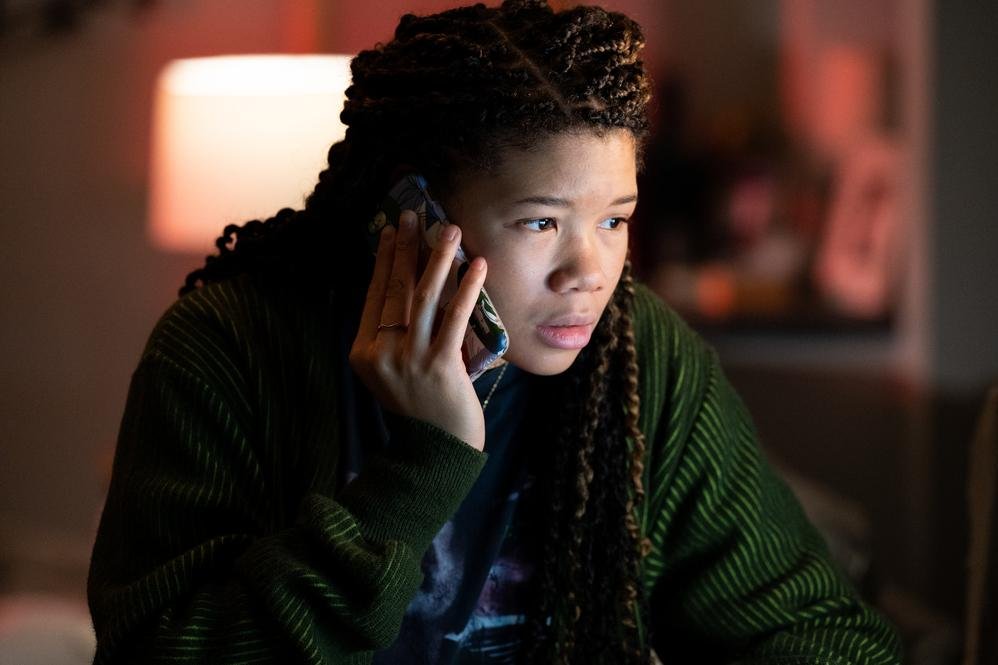By Alex McPherson
Inventively constructed yet saddled with an unwieldy plot, Nicholas D. Johnson and Will Merrick’s screenlife thriller “Missing” undercuts its strengths by appealing to brash, exaggerated storytelling.
A standalone sequel to 2018’s “Searching,” which uses a similar format of taking place entirely via screens, “Missing” follows the 18-year-old June (Storm Reid), a rebellious, always-online teenager living in Los Angeles with her mother, Grace (Nia Long).
June’s father, James (Tim Griffin), passed away over a decade prior, and June continues to grieve — often lashing out at Grace’s protectiveness and constant need to check in with her. Grace and her boyfriend, Kevin (Ken Leung), are about to leave for a week-long vacation in Colombia, giving June free time to party it up at their security-cam-riddled suburban home.
When June arrives at the airport to pick them up, though, they’re not there. After being unable to reach either Grace or Kevin on their phones, June grows increasingly worried that they’re in danger. She takes the investigation into her own hands when authorities don’t act promptly. Time is of the essence, and June — a tech-savvy teen proficient at digital sleuthing— is on the case.
With the help of their lawyer neighbor, Heather (Amy Landecker), a freelance worker June hires named Javi (Joaquim de Almeida), and June’s pal Veena (Megan Suri), June embarks down a labyrinthine rabbit hole of password hacking and web surfing. She makes discoveries that turn her reality upside-down.
By restricting the action to screens — the majority of the film unfolds on June’s computer, where she’s often video-chatting with someone and navigating an insane number of tabs — “Missing” effectively taps into the enormous digital footprints we leave behind, along with the ways in which technology can conceal, and illuminate, different sides of us.
Unfortunately, Johnson and Merrick, who edited “Searching,” neither fully play by the genre’s rules nor craft a compelling yarn to support the gimmick. By layering so many twists upon each other, especially in the third act, “Missing” obscures its most sobering aspects — leaning into schlocky developments that annoy, rather than thrill.
That’s not to say the central concept isn’t engaging, however, even though films like “Searching” and the (far superior) “Profile” have done it before. The format lends an immediacy and tangibility that ramps up suspense, as we observe June using familiar tools to uncover secrets supposedly hidden from view.
Johnson and Merrick aren’t fully confident in the idea — flashbacks, added camerawork, and shifting perspectives attempt to add cinematic flair, ironically breaking immersion — but it’s always nice to watch filmmakers buck tradition.
“Missing” is most successful when it shows how much personal information is accessible if we have the know-how to access it — from one’s immediate location to their online dating messages. The devices that “connect” us are themselves connected, able to communicate with each other like an omnipresent observer.
Although June’s Gen-Z detective skills lead to several satisfying “aha” moments, there’s no shaking the fact that these gadgets and services are violating, and a vessel for manipulation. They’re both helpful for June’s purposes and an extreme invasion of privacy.
Additionally, when the public latches onto the case, and it becomes a viral obsession, we see how truth can be warped beyond recognition, as people capitalize on scandal for their own gain. Johnson and Merrick are obviously critical of true-crime entertainment, too — turning the events of “Searching” into an over-the-top Netflix show — which further complements this idea of corrupted reality.
Reid makes the most of the somewhat cookie-cutter June, who doesn’t have many compelling traits besides her technical smarts. Her strained relationship with Grace provides some emotional grounding, but the script’s melodramatic beats are far from subtle.
Even so, Reid conveys her growing anxiety, fear, epiphanies, and anger convincingly — it’s fun to watch the mystery unfold, for a while, and feel like we’re solving it with her.
Long makes the most of a half-baked role — believable as a mother who, above all, wants the best for her child.
Almeida is the standout as Javi. He provides the bulk of comedic relief, and the film could have used more of his eccentric presence — especially when the story jumps the shark in the final act.
Indeed, despite its limited presentation, “Missing” shows little restraint in its narrative. Red herrings abound, and the film is constantly trying to one-up itself with bonkers reveals that require an absurd suspension of disbelief.
The constant attempts at subverting expectations distract from the most meaningful takeaways involving tech’s hold on modern life. “Missing” sacrifices the “human” element of its story for shock factor — sliding into unintentional comedy with threads that feel ripped straight from a soap opera. By the last “surprise,” the film ends up resembling the scandalous content the filmmakers critique elsewhere.
It’s a shame that “Missing” fumbles so egregiously in the end, since there’s much to praise about this paranoid thriller. At the very least, if you’re not too irritated when it’s all over, you might set up two-factor authentication on all your accounts.
“Missing” is a 2023 mystery thriller co-written and co-directed by Nick D. Johnson and Will Merrick. It stars Nia Long, Storm Reid, Ken Leung, Megan Suri and Amy Landecker. It is rated PG-13 for some strong violence, language, teen drinking, and thematic material and run time is 1 hour, 51 minutes. It opened in theaters on Jan. 20. Alex’s Grade: C+.

Alex McPherson is an unabashed pop culture nerd and a member of the St. Louis Film Critics Association.

